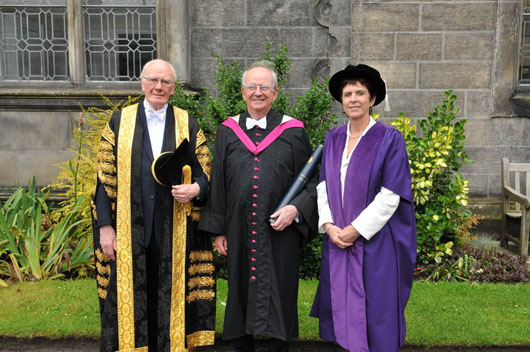Laureation Address – Professor Sir John Meurig Thomas
Professor Sir John Meurig Thomas
Honorary Degree of Doctor of Science
Laureation by Professor Paul Wright
School of Chemistry
Friday 22 June 2012

Chancellor, it is my privilege to present for the Degree of Doctor of Science, honoris causa, Professor Sir John Meurig Thomas.
Professor Sir John Meurig Thomas is one of the great British scientists of the last decades, known worldwide for his research achievements in solid state chemistry and catalytic science, his appreciation of the themes and connections between past and present science and scientists, and his inspirational and eloquent dissemination of the elegance and utility of science to a wider audience through lectures, articles, reviews and books.
The scientific legacy of his research is in the understanding of the use of solids as efficient and environmentally-benign catalysts for green chemical processes, via pioneering application of new analytical methods and the design of novel materials. Almost all the materials and chemicals we use have been in contact with a catalyst at some point in their history – Sir John’s research has enabled these processes to be understood better and made cleaner, by increasing efficiency and reducing waste.
Born in Llanelli into a coal-mining community, Sir John’s grammar school education inspired him to a life-long love of science. He started his academic career at Bangor, where he developed his interests in solid-state, materials and surface sciences well before they occupied their current elevated position in the chemical sciences. As professor at Aberystwyth he established the world’s leading group in the chemistry of solids and their surfaces and championed the introduction and exploitation of electron microscopy within chemistry. This exploitation of novel methods has been a constant theme within his work. Another key theme begun in Wales was the use of silicates for important transformations of organic molecules, which was to broaden to his catalytic studies. After ‘Aber’, Cambridge called, and he became Professor and Head of the Physical Chemistry Department there in 1978. At Cambridge, his appointment led to a transformation of the teaching of Physical Chemistry as well as to a burgeoning solid state chemistry research group. In particular, he began his pioneering studies on zeolites and related catalysts there, with the application of emergent electron microscopy and spectroscopy, neutron and X-ray diffraction, solid state NMR and computer modelling to important problems.
His growing renown made him an ideal successor to Lord Porter as Director of the Royal Institution of Great Britain, where he further developed his research to investigate catalysts under working conditions, a challenging but essential step in understanding their performance. During this period he also designed new classes of porous and supported catalysts, and established the concept of single site heterogeneous catalysts, with high selectivity for important chemical conversions of bulk and fine chemicals. The Royal Institution was an ideal platform for Professor Thomas to disseminate his and others’ research, including the televised Royal Institution Christmas lectures in 1987, and to host the Friday Evening Discourses to lay audiences at the RI. This combination of research and education led in 1991 to him being awarded a knighthood by Queen Elizabeth II for “Services to Chemistry and the Popularisation of Science”. Since 2002 he has been Honorary Professor of Materials Science, University of Cambridge, and has continued to collaborate, lecture and write extensively.
John Meurig Thomas is the author of well over a thousand research and review articles on materials and surface chemistry of solids as well as on education and cultural issues. He is the co-author of 30 patents, and 6 books, one in Welsh, including monographs and a biography of Michael Faraday. He holds over forty honorary fellowships in universities and colleges in the UK and elsewhere in the world. He has won very many prizes, including, perhaps most notably, the Willard Gibbs Gold Medal of the American Chemistry Society “for pioneering work in solid-state chemistry and materials science…His original work (on solids) has led to major advances in the science and technology of absorbents and catalysts”. It is a remarkable coincidence that the last British scientist to win the Gibbs Gold Medal of the American Chemistry Society previous to Professor Thomas was our own James Colquhoun Irvine, whilst Principal here, in 1926.
He has also been unstinting in his efforts for Higher Education and Science in the UK and beyond as well as being the Director of the Royal Institution, he has served as Deputy Pro-Chancellor of the University of Wales, as Government Advisor on the Council on Applied Research and Development at the Cabinet Office and as Chairman of CHEMRAWN (Chemical Research Applied to World Needs) of IUPAC. He was the first scientist to be Master of Peterhouse College, the oldest in Cambridge.
Professor Sir John Meurig Thomas is an outstanding physical chemist and scientific communicator. He is a passionate advocate of the importance of university in education and research, and its global reach, and an inspirational figure whenever lecturing, discussion, writing or broadcasting. A major part of his legacy is in his tutelage and mentoring of students, fellows and colleagues who have gone on to academic and industrial careers. Two, Professor Wuzong Zhou and myself, are on the staff here at St Andrews. Indeed, Professor Thomas has long been a friend to St Andrews, and only a few weeks ago visited us to give a spellbinding 600th Anniversary lecture on the Genius of Michael Faraday to a packed theatre.
Chancellor, in recognition of his major contribution to physical chemistry and catalysis, I invite you to confer on Professor Sir John Meurig Thomas the Degree of Doctor of Science honoris causa.
Category Awards